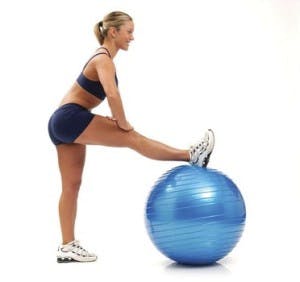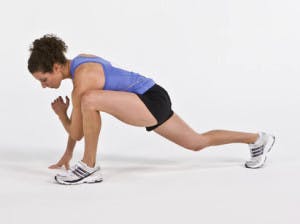Hamstring injuries are widespread in today’s active society, and we at Action Physical Therapy are here to get you back on your feet and back out into the world. Champions and competitors of various sports and activities have come to us for treatment and have been able to return to competition just as strong as before their injury. For more information, check out their testimonials.
Rapid Recovery from Hamstring Injuries
The hamstring muscles, located at the back of the thigh, are comprised of three muscle groups. Injuries to this muscle are common in athletes participating in sports such as football or basketball. They are also common in ‘weekend warriors’ and individuals who participate in walking, jogging or running without a period of adequate warm-up and stretching.
This muscle group allows your knee to bend and plays a critical role in every activity involving the lower body. For example, your hamstrings contract every single time you take a step, climb a flight of stairs or get in and out of your car.
The anatomy of this muscle group

The three muscle groups that comprise the hamstrings include the biceps femoris, semimembranosus, and semitendinosus. A partial or complete tear of either of these muscles is a likely possibility in hamstring injuries.
Cause of hamstring muscle injury
A sudden, excessive stress on this muscle group is a common cause of injury. An individual with a previous history of hamstring injuries is more likely to get re-injured. Hamstring muscle tightness and inadequate warm-up can also cause injuries.
The Role of the Physical Therapist
The role of the physical therapist is essential in managing patients with hamstring injuries. Before treatment, the therapist will obtain a detailed history and perform a clinical examination to ascertain the degree of injury and the muscle groups involved. This will help create a foundation for a safe and effective treatment program.
For recent injuries, the therapist would recommend rest since the primary goal is to avoid an increase in pain and excessive strain on sensitive muscles and ligaments. You may be asked to avoid exercise and, in some cases, avoid walking. You may be asked to use crutches for support.
To deal with the pain associated with such injuries, the therapist may recommend an ice pack and a compression bandage to reduce swelling.
Physical therapists will prescribe and supervise a structured exercise program once the acute injury phase (and the associated pain and swelling) has subsided. These can include:

- Muscle strength exercises – including static and dynamic strength exercises to help regain strength as quickly as possible.
- Range of motion – including active and passive range of motion exercises that can be a partial or complete range of motion. This helps maintain mobility and minimize muscle tightness.
- Provision of support devices – The use of assistive devices like crutches, walkers or canes to walk short distances is helpful for patients during the recovery phase. The physical therapist will help analyze the need for such a device, identify the right device (if needed) and assist in acquiring such a device.
Restoration of Control
In addition to the restoration of strength and mobility, an important objective of physical therapy is to restore muscle control and balance following hamstring injuries.
When the hamstrings are injured, the strength ratio between the quadriceps (muscles at the front of the thigh) and the hamstrings is also impacted. Weakness or tightness in the hamstrings (as a result of an injury) can also put you at an increased risk of injury to the ACL, or anterior cruciate ligament, which is a ligament that facilitates knee stability.

Exercises involving balance, weight-bearing and unexpected shifts in direction can improve strength and stability in the hamstring muscles. For an athlete recovering from hamstring injuries, a physical therapist will work on motor control and help train sport-specific movements.
Whether you are a weekend warrior or an athlete suffering from a hamstring injury, physical therapy can help. In fact, the scope of physical therapy extends far beyond hamstring injuries and includes pain relief and restoration of function for any muscle injury in the body. Give us a call at (215) 947-3443, and we’ll help you regain control of your muscles as quickly as possible.

